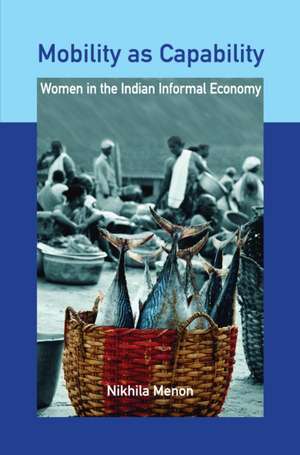Mobility as Capability: Women in the Indian Informal Economy
Autor Nikhila Menonen Limba Engleză Hardback – 29 sep 2021
Preț: 578.24 lei
Preț vechi: 649.70 lei
-11% Nou
Puncte Express: 867
Preț estimativ în valută:
110.65€ • 120.57$ • 93.24£
110.65€ • 120.57$ • 93.24£
Carte disponibilă
Livrare economică 03-17 aprilie
Preluare comenzi: 021 569.72.76
Specificații
ISBN-13: 9781108836425
ISBN-10: 1108836429
Pagini: 208
Dimensiuni: 160 x 235 x 17 mm
Greutate: 0.41 kg
Editura: Cambridge University Press
Colecția Cambridge University Press
Locul publicării:Cambridge, United Kingdom
ISBN-10: 1108836429
Pagini: 208
Dimensiuni: 160 x 235 x 17 mm
Greutate: 0.41 kg
Editura: Cambridge University Press
Colecția Cambridge University Press
Locul publicării:Cambridge, United Kingdom
Cuprins
List of Tables; List of Figures; 1. Transformational Mobility as Capability; 2. Reflections on Transformational Mobility, Autonomy and Women's Work; 3. Women in 'Kerala Model': Myths and Realities; 4. Situating Informal Work by Women in Fisheries in Kerala; 5. 'Measuring Mobility' of Women: Unravelling the 'Explicit' and the 'Implicit'; 6. Pathways to Transformational Mobility of Women Workers: A Qualitative Comparative Analysis; 7. 'Subordinating Self': 'Maneuvering Patriarchy' among Women Workers; 8. Self Categorisation, Group Identity and Agency among Women Fish Vendors; 9. Transformational Mobility: From Individual to Collective Agency of Informal Women Workers; Bibliography; Index.
Recenzii
'Menon questions prevailing assumptions that women's mobility, their freedom and ability to move beyond their households into paid work, necessarily enhances their autonomy and empowerment. She draws on Sen's capability approach to theorize her innovative concept of 'transformational mobility' to assess whether women's work mobility is empowering. Her inter-disciplinary analysis is applied to a fascinating comparison of informal women working in seafood processing versus self-employed fish vendors in Kerala, India. Her findings demonstrate that paid work outside the household is not sufficient to enhance women's agency and autonomy. Transformational mobility is more likely under circumstances where women have greater collective agency and ability to bargain over their working conditions. Menon's book is essential reading for all researchers, practitioners and policy makers focusing on women's work in domestic and global production. It advances an insightful analysis of transformational mobility applicable to assessing a range of occupations. It provides a challenging contribution to current thinking on constraints and potential for women's social and economic empowerment.' Stephanie Barrientos, University of Manchester
'Menon's book shatters the myths regarding the exalted status of women in Kerala by drawing attention to the deprivation, segregation in low skilled work, gender gaps in wages and poor working conditions suffered by women engaged in informal work in fisheries. Drawing attention to the constraints imposed on women by patriarchal social structures in Kerala, she questions the prevailing arguments that translate mobility into autonomy and agency. She compares this constrained state with what she calls 'Transformational mobility' or freedom in the real sense, a state of non-domination. The pathways to autonomy of women are fraught with several challenges which can be addressed with better understanding of the underlying gender norms, which this book attempts to unravel. The book is a must-read for anyone working in the field of development and gender.' Aasha Kapur Mehta, Institute for Human Development, New Delhi
'The work on Mobility as Capability reflects on a wide range of issues, enhancing our understanding of mobility, autonomy, and agency, and the intersectionality in the context of gender and work. Situating informal work by women in some of the dynamic activities in Kerala the volume envisages women's work mobility as an indicator of autonomy and agency in terms of capability approach. The work displays commendable originality and innovative thinking, which will stir our reasoning and encourage future research in this direction to help policy initiatives happen in an effective manner.' Arup Mitra, Institute of Economic Growth, New Delhi
'Menon's book shatters the myths regarding the exalted status of women in Kerala by drawing attention to the deprivation, segregation in low skilled work, gender gaps in wages and poor working conditions suffered by women engaged in informal work in fisheries. Drawing attention to the constraints imposed on women by patriarchal social structures in Kerala, she questions the prevailing arguments that translate mobility into autonomy and agency. She compares this constrained state with what she calls 'Transformational mobility' or freedom in the real sense, a state of non-domination. The pathways to autonomy of women are fraught with several challenges which can be addressed with better understanding of the underlying gender norms, which this book attempts to unravel. The book is a must-read for anyone working in the field of development and gender.' Aasha Kapur Mehta, Institute for Human Development, New Delhi
'The work on Mobility as Capability reflects on a wide range of issues, enhancing our understanding of mobility, autonomy, and agency, and the intersectionality in the context of gender and work. Situating informal work by women in some of the dynamic activities in Kerala the volume envisages women's work mobility as an indicator of autonomy and agency in terms of capability approach. The work displays commendable originality and innovative thinking, which will stir our reasoning and encourage future research in this direction to help policy initiatives happen in an effective manner.' Arup Mitra, Institute of Economic Growth, New Delhi
Notă biografică
Descriere
The book provides valuable insights on the dynamics of women's mobility, autonomy and agency in India's informal labour market.
